Juror Attitudes and the Coronavirus:
Top 10 Takeaways from a Year of Research Studies

In the early days of the COVID-19 pandemic, we all had a sense that our country and the world were facing a potentially cataclysmic event with far-reaching, significant consequences to many aspects of our lives. As social scientists, we immediately set out to study the impact that COVID-19 might have in terms of litigating cases both now and in the future. Since the first COVID-19 shutdown, DecisionQuest has fielded a series of large-scale surveys to assess respondents’ demographics, COVID-19-related experiences and opinions, attitudes relevant to various areas of litigation and their feelings about serving on a jury in the next several months. Across four surveys[1], DecisionQuest has collected data from 3,970 jury-eligible adults in nine states (California, New York, New Jersey, Illinois, Florida, Pennsylvania, Texas, Minnesota and North Carolina). A series of articles and blog posts have summarized data and analyses from the first three surveys. As vaccination rates increase and courts begin to resume jury trials, we conclude the survey series with some key takeaways and interesting shifts in opinions over time.
Our Lives With COVID-19
- People are still wary of COVID-19.
Concern about COVID-19 infections among the public were very high when we conducted our first survey in March 2020 and remained consistently high over the course of the year, with a slight dip in September 2020. New York respondents reported slightly higher levels of concern compared to other states. The number of people reporting that they or someone close to them had contracted COVID-19 grew, with the largest increase among Baby Boomers between September 2020 and March 2021. Overall, roughly half of respondents have agreed the seriousness of COVID-19 was correctly estimated over the course of the year, again with a slight dip in September. Those who believed it was underestimated were more likely to be politically liberal, while those who believed it was exaggerated were more likely to be politically conservative. Overall, concern about infection has remained relatively high since the start of the pandemic but, unsurprisingly, has shifted a bit over time to reflect national infection rates as the relationship between political orientation and beliefs about the pandemic solidified. As discussed below, heightened concern about infection is likely to impact who ends up on a jury during the pandemic, and fear of infection, political orientation and pro-plaintiff/pro-defense orientation are all inter-related.
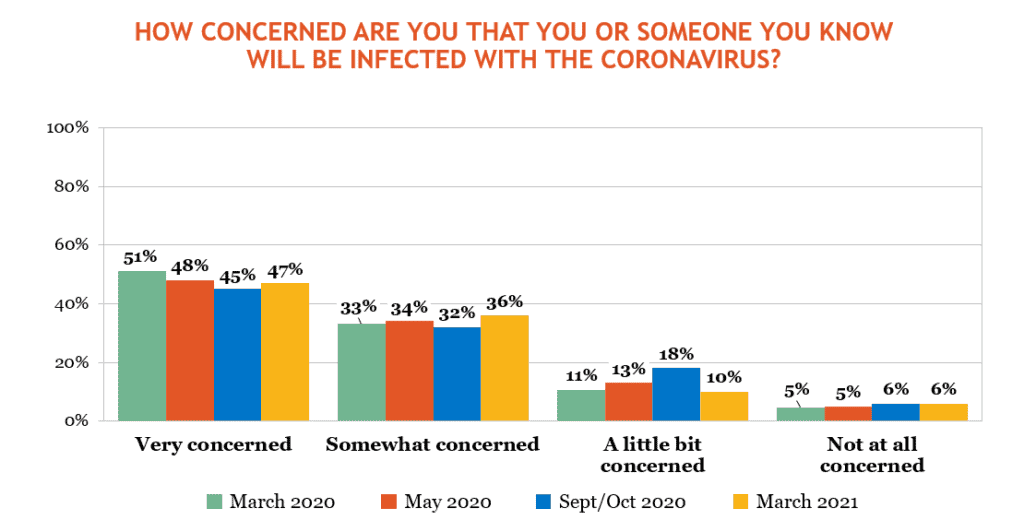

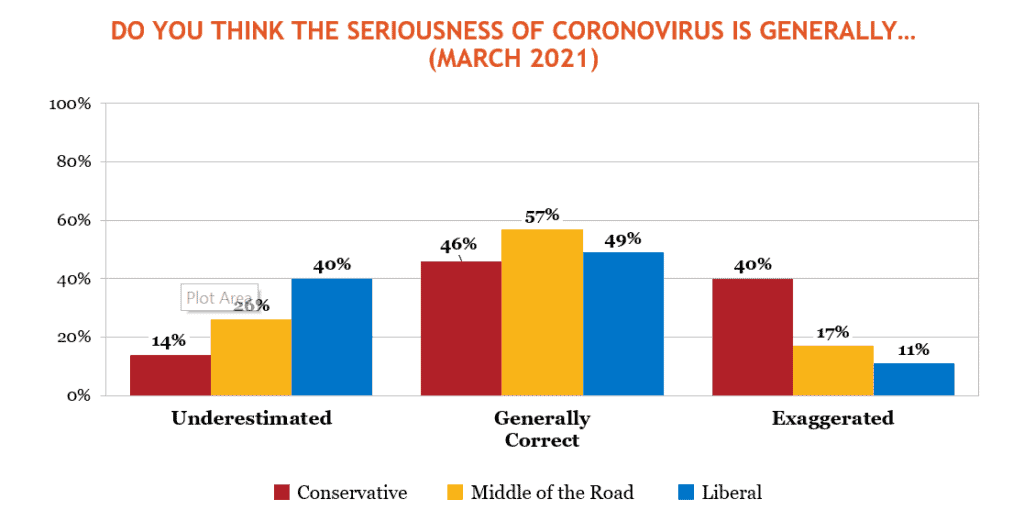
2. COVID-19 has had a profound impact on our lives.
As in March 2020, a large majority of respondents were still reporting a year later, in March 2021, that COVID-19 was causing at least some disruption in their lives. Compared to Spring of 2020, more people were leaving their houses by October 2020, but most were not “living their lives normally.” Overall, the number of people reporting a job loss in the family remained remarkably consistent, but with Millennials and Gen Z’ers reporting more job loss than older respondents. Finally, almost two-thirds of respondents are still somewhat or very concerned about the impact of the pandemic on the economy. Ultimately, COVID-19 has dramatically changed most people’s lives for over a year, but for some more than others. Jurors who have recently experienced negative life events and instability, such as extreme economic hardship, losing a loved one or serious illness, often display a greater ability to identify with plaintiffs – they feel the plaintiffs’ pain. After a year of living through a pandemic and all it entails, it is reasonable to expect an increase in the numbers of jurors who have experienced recent negative life events and instability and an increased ability to empathize with plaintiffs.
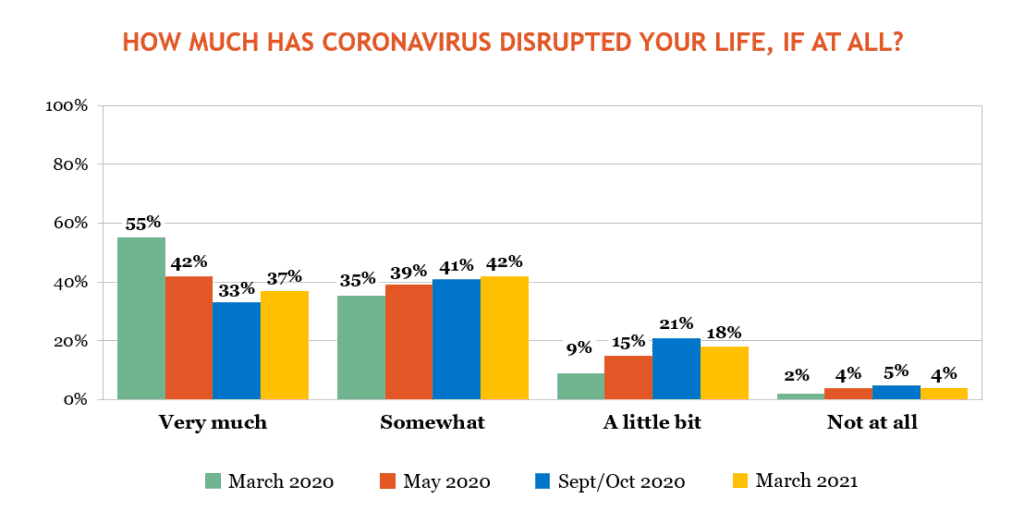
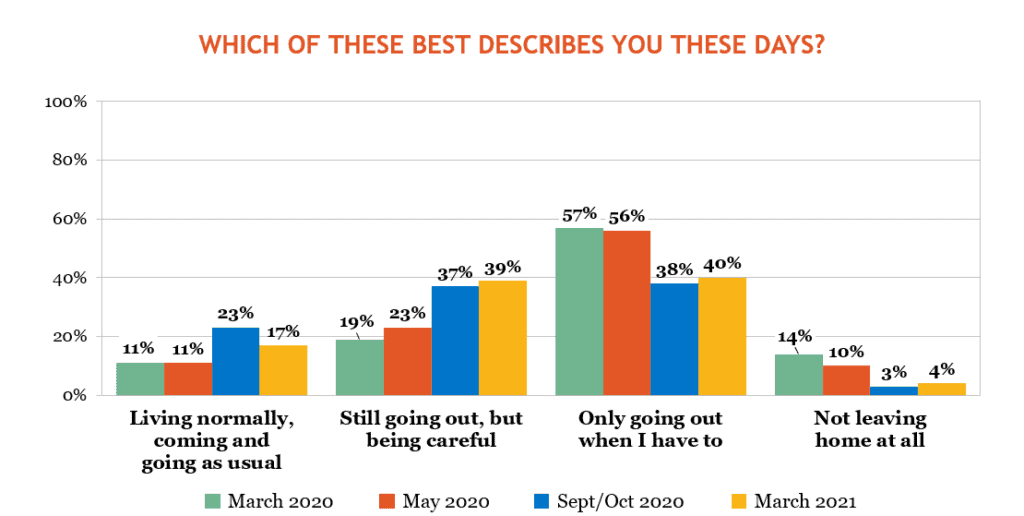
3. Conservative skepticism of COVID-19 is weakening (a bit).
Reactions to COVID-19 among conservative respondents appeared to slightly shift between September 2020 and March 2021. Among conservatives, support for Donald Trump’s handling of the pandemic dropped, fewer reported COVID-19 was being exaggerated, and more wanted to get vaccinated. Our surveys, along with many others, showed a strong relationship between political orientation and beliefs about several aspects of COVID-19. However, with national elections over, vaccination rates increasing and people taking small steps toward normalcy, optimism might slowly chip away at that relationship.
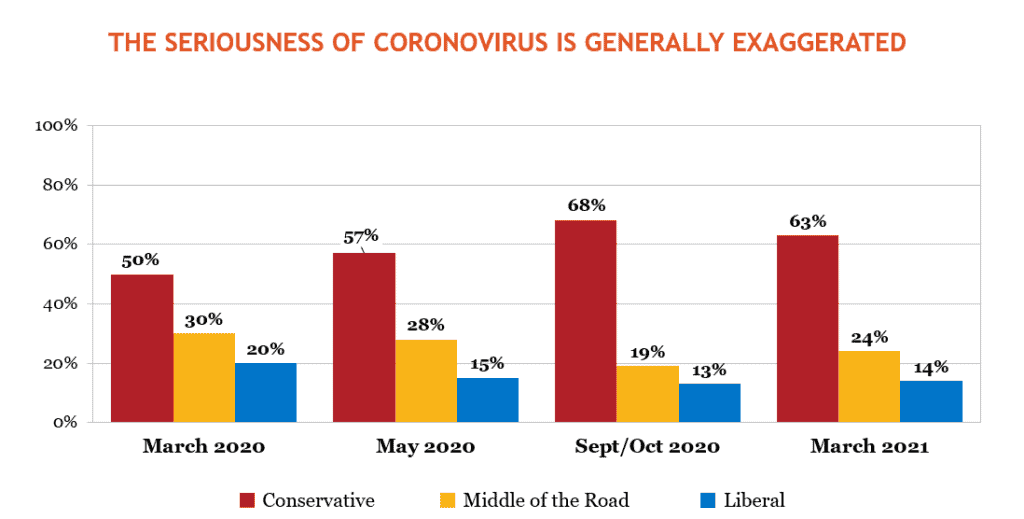
COVID-19 and Science
4. Despite a growing distrust of “those in charge,” most people trust science and scientists.
A large majority of respondents reported having less trust in leaders and institutions than they did four years ago. However, as in other large surveys, most respondents said they did trust scientists to act in the best interest of the public. Overall, a small minority overall (18%) reported trusting their faith more than science, but this varied geographically, with as few as 11% prioritizing faith in New York, and as many as 24% and 25% prioritizing faith in Texas and North Carolina (respectively). While the evolving science around COVID-19 did put off some respondents, most said it either did not impact them or made them trust science more. Only a very small number (11%) said it would make them less trusting of scientific experts testifying at trial. One concern among litigators was that the sudden high profile of scientists and their evolving recommendations would undermine the credibility of testifying scientific experts, but that does not appear to be the case for most of our respondents.
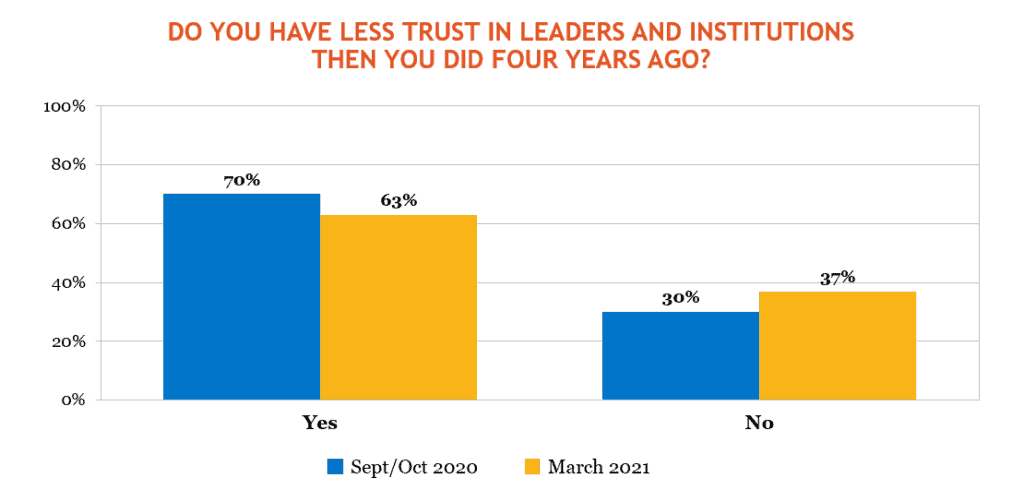
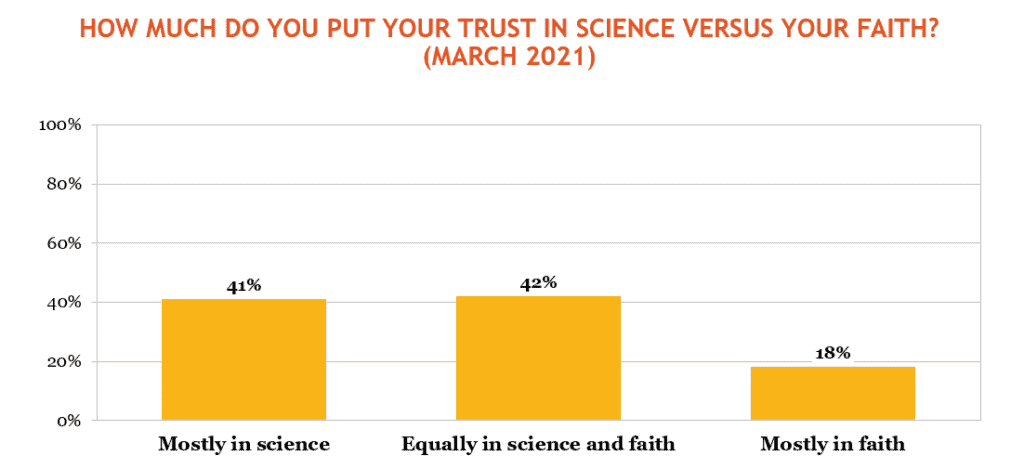
5. The successful emergency authorization of multiple vaccines helped increase trust and mitigate distrust of the science surrounding COVID-19.
Even though pharmaceutical companies developed multiple vaccines in record-breaking time, the fact that the scientific community was learning about COVID-19 in real time, and changing recommendations as they did so, led some to distrust their recommendations. However, the successful emergency authorization of multiple vaccines and growing vaccination rates have worked to both increase trust and mitigate distrust of science and scientists (and give a slight boost to leaders and institutions overall). Not only did survey respondents become notably more open to a COVID-19 vaccine over time (as other surveys have also indicated), but the vaccine successes have also helped increase public trust in pharmaceutical companies in general. It’s difficult to know how long the “honeymoon” will last, but, at least in the short term, pharmaceutical companies and the scientific community in general have earned some goodwill that, unless there is some other corporate wrongdoing at issue, could benefit them in the courtroom.
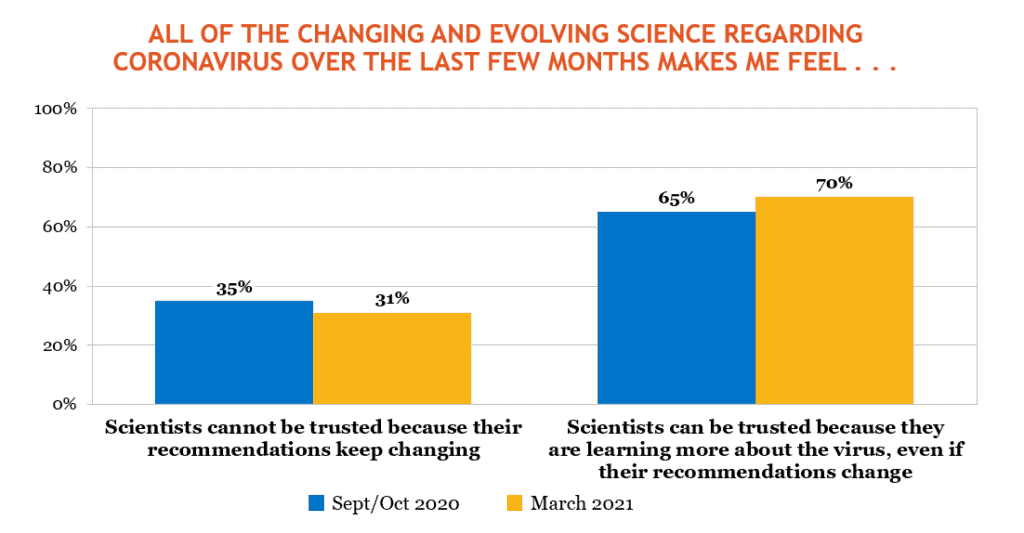
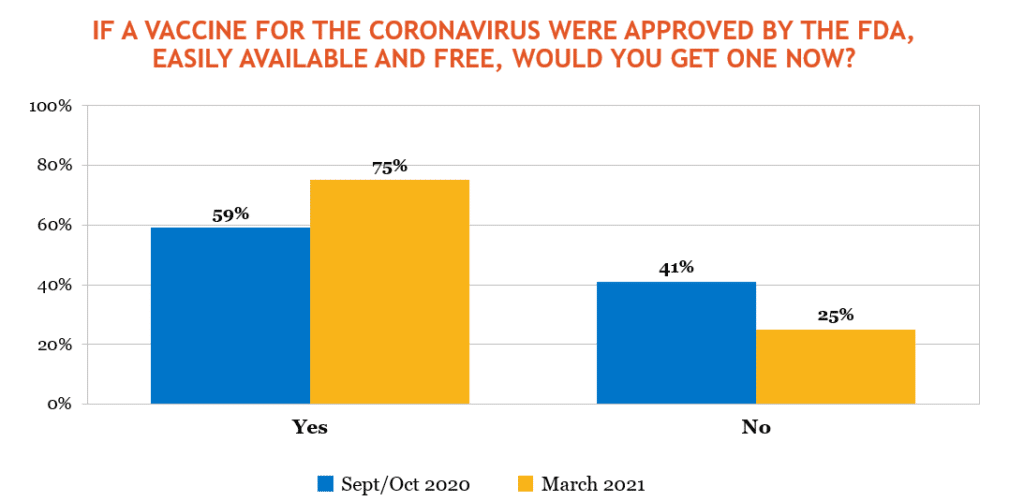
COVID-19 and the Courts
6. Respondents are still wary of serving on a jury in-person.
As of March 2021, roughly half of all respondents would rather wait at least a few months before serving on a jury in-person, would request a postponement of their jury service if summoned to serve in person and would find serving on a week-long trial a severe financial hardship. If forced to appear in person, even more (60%) would be somewhat to very concerned about their health while in the courthouse. However, while a small minority would be comfortable serving in the immediate future, that number has grown since March 2020. Similarly, fewer people are limiting their daily activities later in the pandemic. As the pandemic has worn on, some have become desensitized to their fear, learned to manage it or have become less afraid altogether. While concern about infection remains high among some portions of the population, this will continue to impact the abilities of courts to hold jury trials. Rates of jury summons responses have varied venue to venue, with some courts reporting show rates as low as 5%. Courts holding in-person trials are doing all they can to make jurors feel comfortable in courthouses, but some are having more success than others.
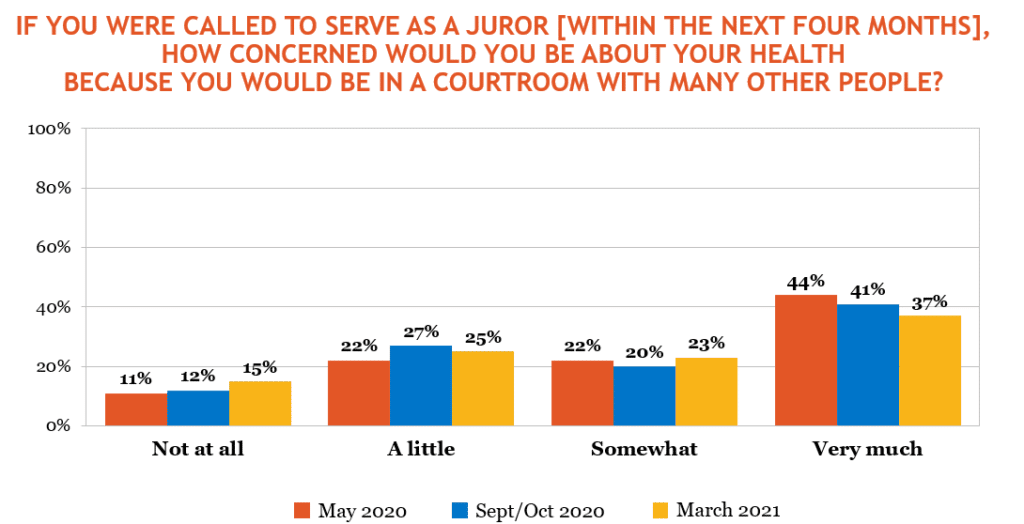
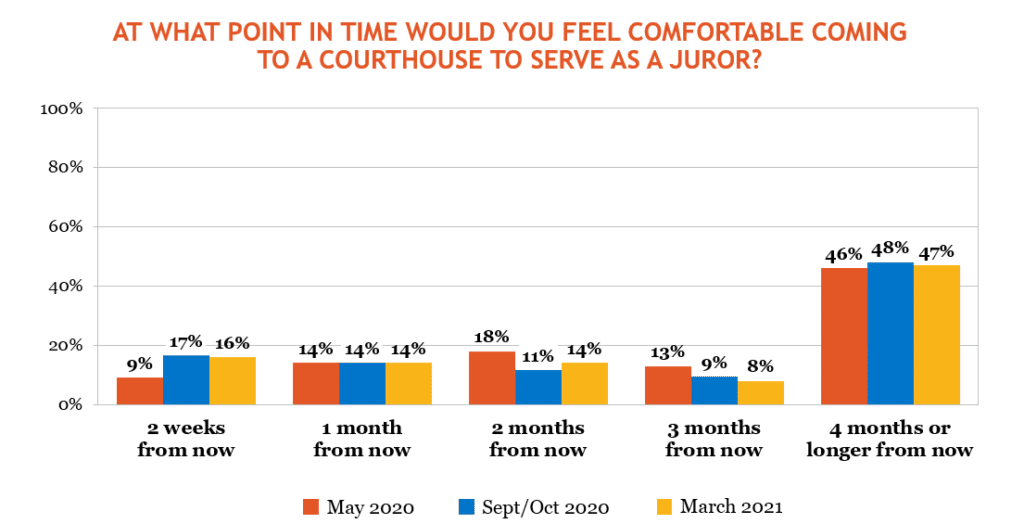
7. Safety measures would help many people, but not everyone, feel more comfortable serving.
Even though many respondents would prefer not to serve in-person in the immediate future, common safety precautions taken in most courthouses and other public areas (requiring masks, temperature checks and social distancing) would alleviate at least some concern for most respondents. Similarly, most would not avoid serving in order to avoid wearing a mask. Our surveys indicate these safety measures will help many jurors feel more comfortable serving, but not all. Other measures have included plexiglass throughout the courtroom, conducting jury selection remotely and/or utilizing online juror questionnaires to limit the number of people coming into the courthouse and posting videos of courthouse procedures to the courts’ websites. Survey respondents who had served as a juror in the past were also more comfortable serving now, indicating familiarity with the setting also helps them feel more comfortable visiting in the pandemic. In general, the more outreach a court does, in addition to utilizing the basic safety measures, the more comfortable the local jurors will be in spending their time in the courthouse.
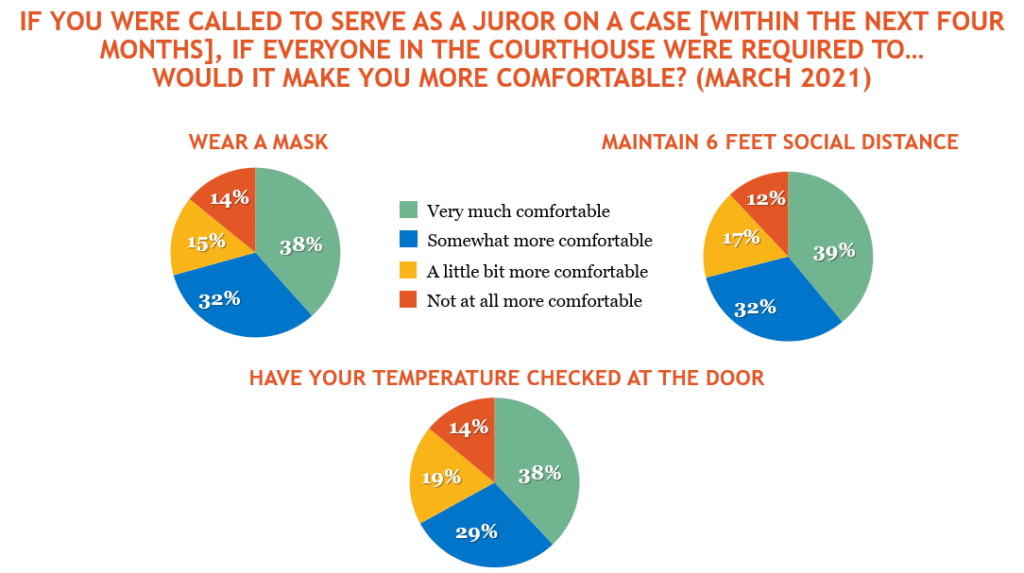
COVID-19 and Your Cases
8. Respondent attitudes are generally favorable of large corporations, but specific attitudes towards common defendants is more variable.
Despite the hard knocks “corporate America” gets in the popular press, general opinions of large corporations tend to be fairly positive (and have slightly improved since 2018 and during the pandemic)—until you start drilling down into more specific aspects of corporate behavior. Most respondents find something about corporate America that makes them angry, including expecting them to break agreements when it suits them. Respondents are also skeptical of insurance companies’ motives when it comes to paying claims. Further, support for more government regulation of large corporations and various specific industries (insurance companies, pharmaceutical companies, etc.) have increased over the last several years as both corporate profits and economic disparities have grown. As with other survey measures, opinions improved or worsened with pandemic conditions. When jurors are hurting, they are more likely to see risk, want protection from risk and help others harmed by that risk. This does not necessarily mean they will all see wrongdoing everywhere. Litigants will need to take care to find out which potential jurors feel that risk more or less than others.
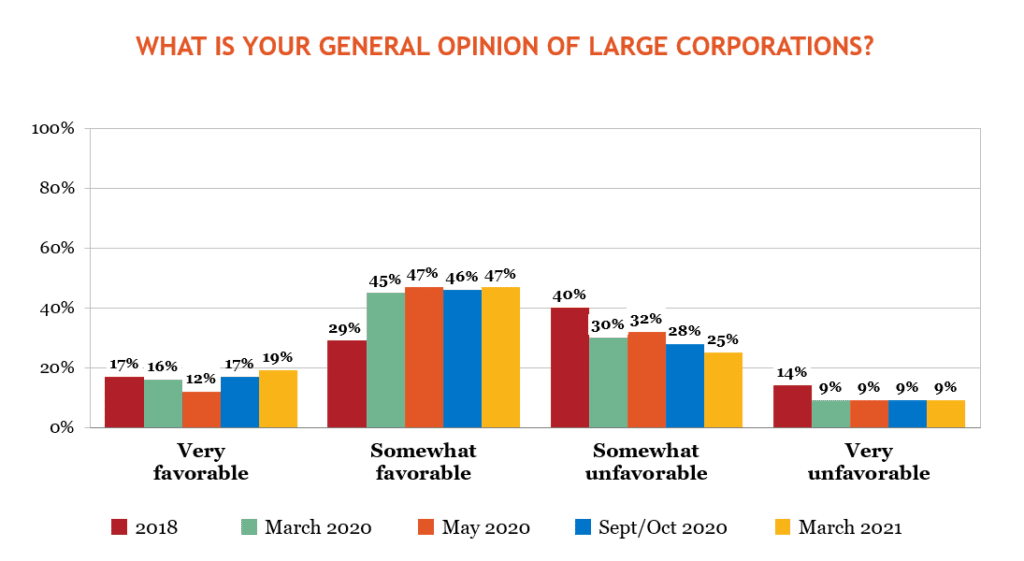
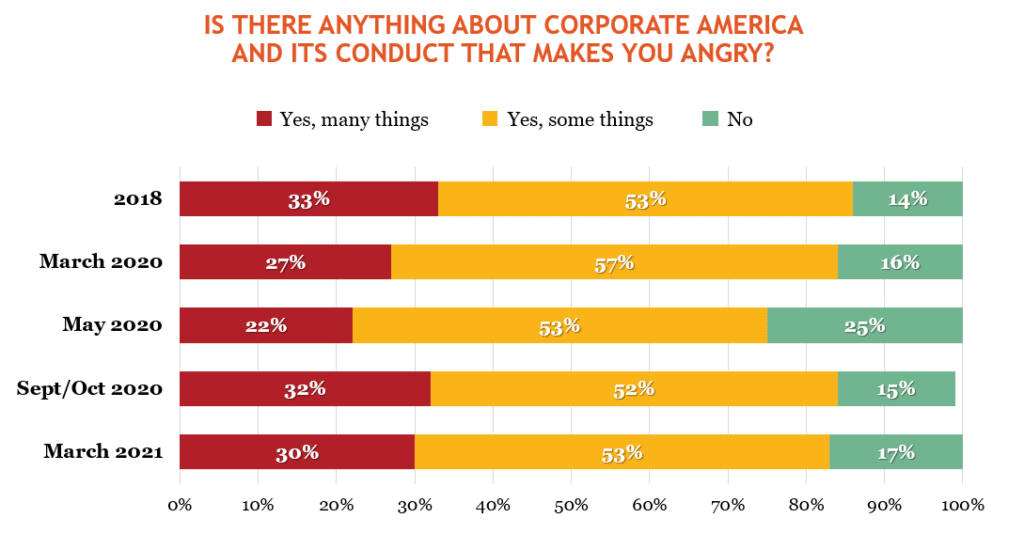
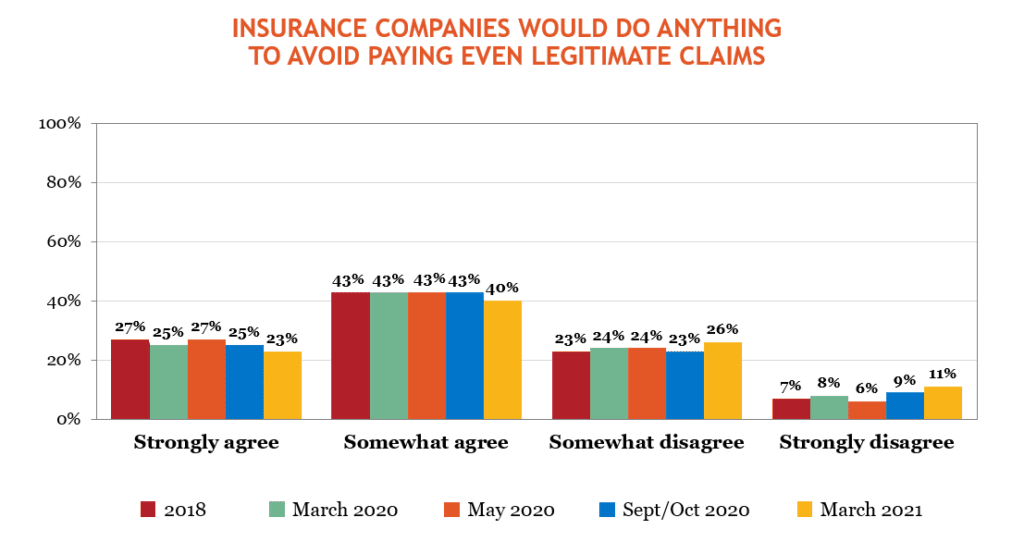
9. Emergency authorization for vaccines is providing a light at the end of the pandemic tunnel and has enhanced opinions of the FDA and pharmaceutical companies, but not necessarily of healthcare providers.
Opinions of the FDA were already quite high early in the pandemic and have remained high, and opinions of pharma companies have slightly improved between Sept 2020 and March 2021. One common theme during the pandemic has been support for healthcare providers, from people sending meals to hospitals and organizing clapping or serenades throughout cities all over the world. However, just as many other global attitudes are limited in their applicability, it’s not clear that this goodwill will lead people to be more protective of healthcare providers in medical malpractice cases. For example, in March 2021, slightly more than half of respondents believed serious, life-threatening medical mistakes were at least somewhat common, and fewer than half (47%) agreed lawsuits against doctors should be very limited. Positive images of healthcare providers due to the pandemic may not protect them from specific malpractice claims.
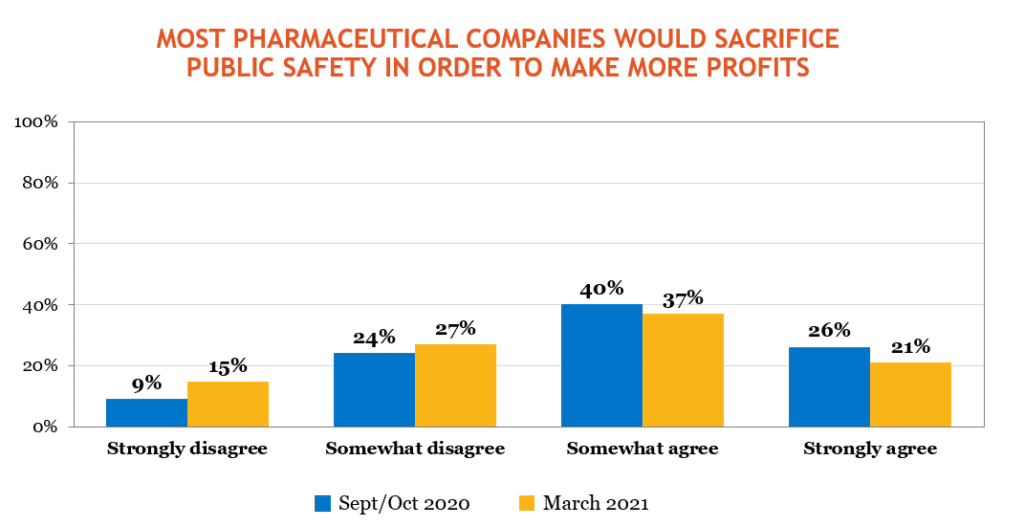
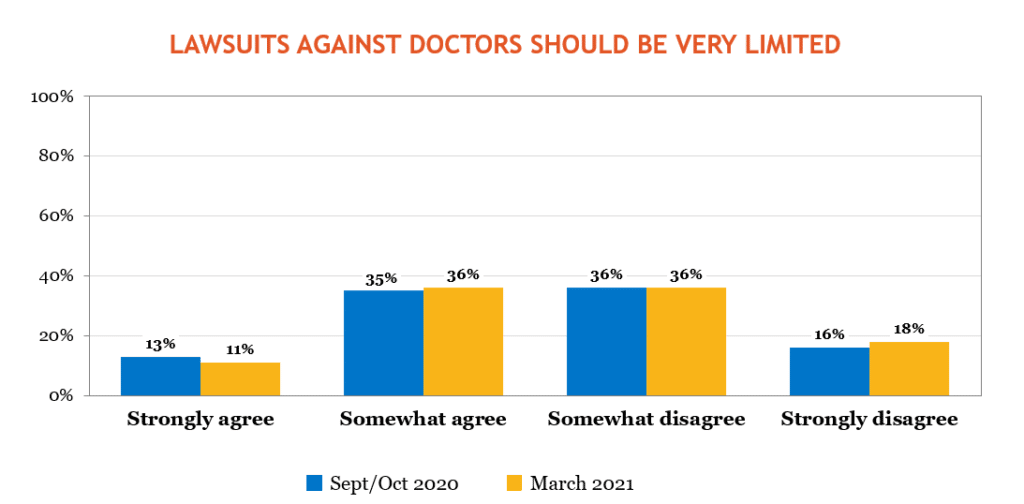
10. Those who would be very concerned about their health while in a courthouse held more extreme pro-plaintiff attitudes, with one notable exception.
Consistent with earlier DecisionQuest and other surveys, respondents who were most concerned about COVID-19, particularly while serving as a juror, were more likely to hold extreme pro-plaintiff opinions specific to several areas of litigation: insurance, employment, pharmaceutical safety, medical malpractice, the need for increased government regulation and the use of litigation to police bad corporate actors. The reverse is also true. Those who are unafraid to serve on a jury are more likely to hold extreme pro-defense attitudes, but there are far fewer of them. They were outnumbered by those very concerned about their health by 2.5 to 1. While this parallel has weakened a bit in March 2021 compared to in earlier surveys, the relationship has remained significant throughout the series of surveys. Judges are reporting that they are more lenient with jurors who are high risk or otherwise extremely concerned about their health. Civil defendants will likely find that jurors they would have struck via peremptory challenges are being dismissed by judges, leaving them more discretion to exercise their peremptory challenges among the remaining, less problematic jurors.
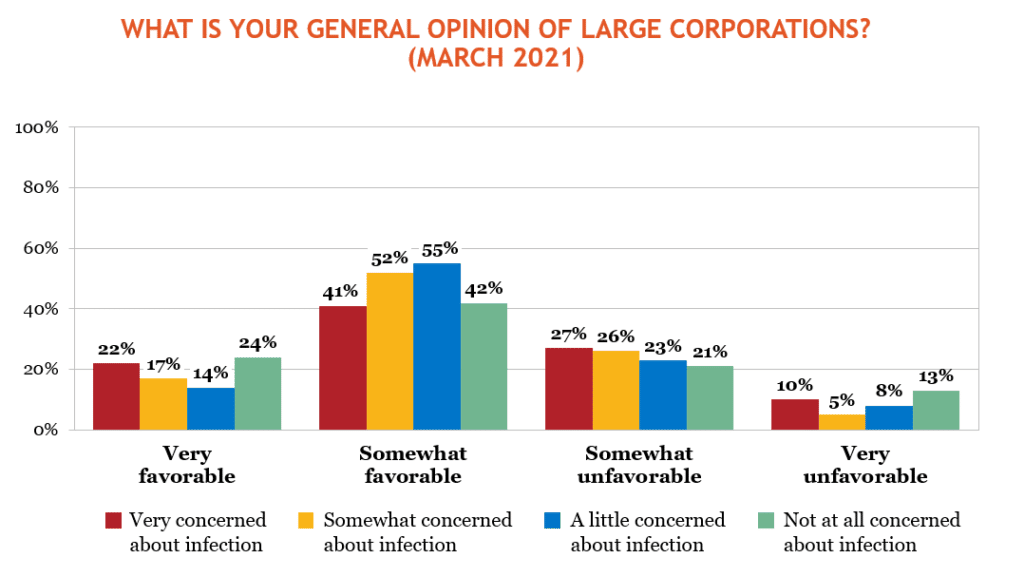
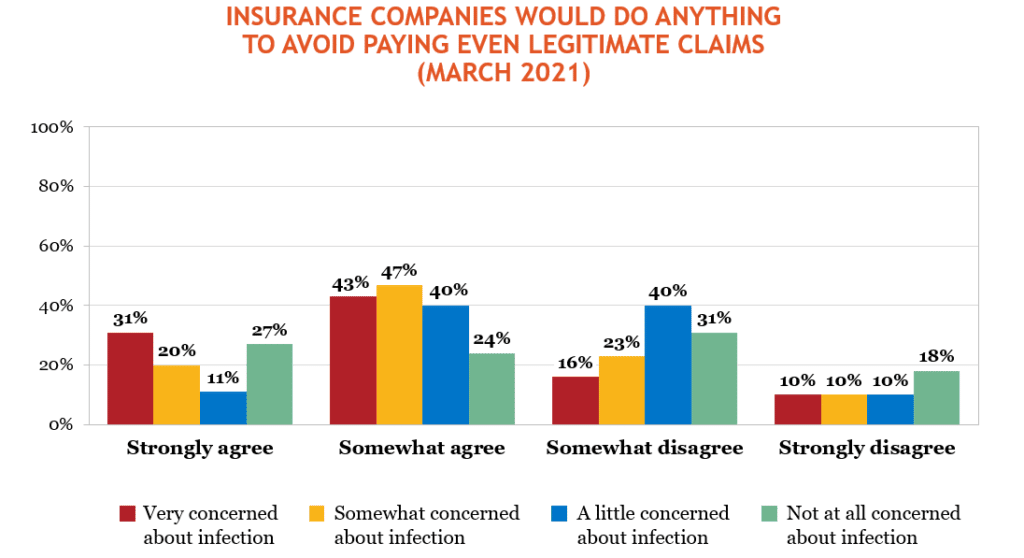
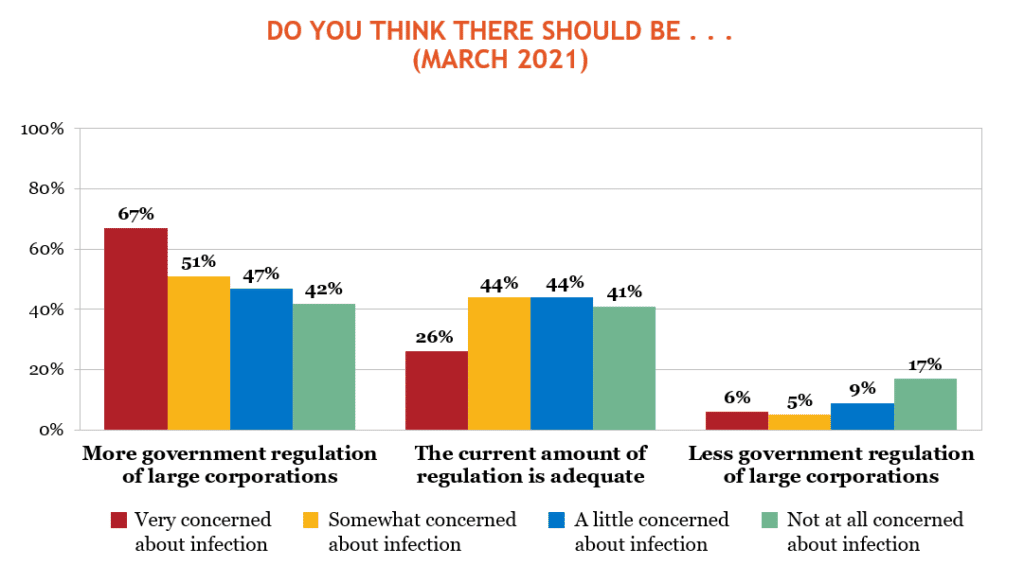
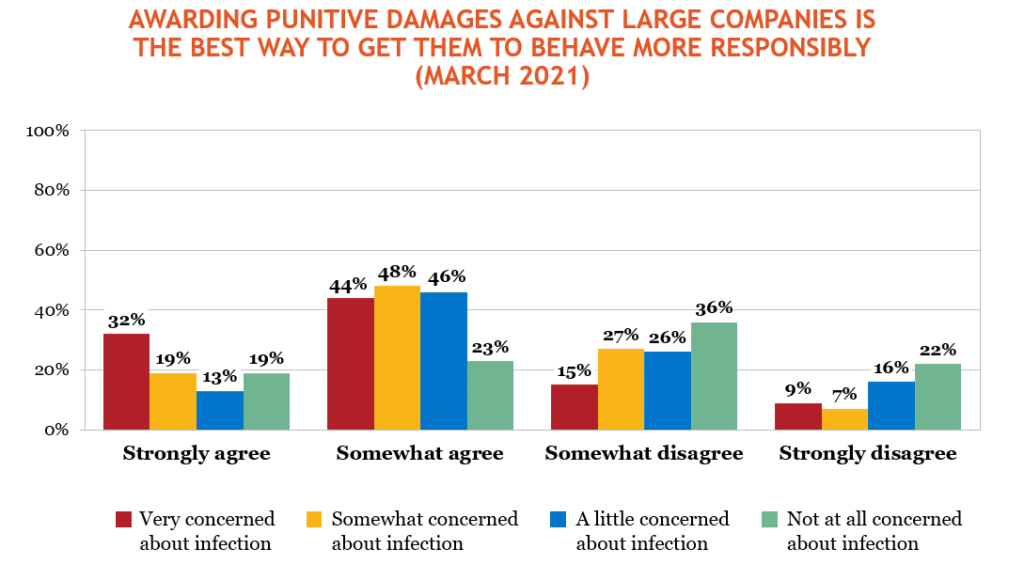
While the pandemic is ongoing, DecisionQuest will continue to monitor shifting juror attitudes through additional research studies. As jury trials continue to resume in many jurisdictions and vaccination rates increase across the country, we expect to see an evolving landscape of litigation-relevant attitudes. To explore our findings in greater detail and discuss how the data may impact your upcoming case, please reach out to our litigation consultants at trialservices@uslegalsupport.com.
[1] Data was collected in March 2020, May 2020, late September/early October 2020, and March 2021.
Editoral Policy
Content published on the U.S. Legal Support blog is reviewed by professionals in the legal and litigation support services field to help ensure accurate information. The information provided in this blog is for informational purposes only and should not be construed as legal advice for attorneys or clients.

